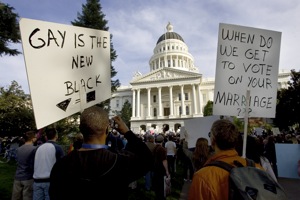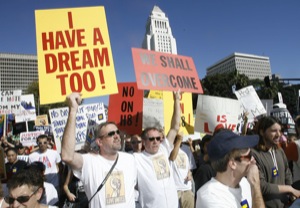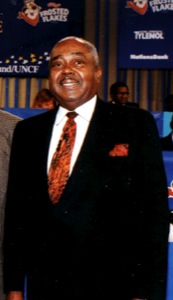-
- George Mason University picks man as homecoming queen
- Comments about gays cost lawmaker committee position
- Sean Penn wins best-actor Oscar for ‘Milk’
- Calif. lawmakers back Prop. 8 challenge
- Anti-marriage spot called ‘sniper ad’
- Bias ruled out in NY GLBT youth center vandalism
- Group fights anti-gay adoption bill
- National News Briefs
- World News Briefs
feature
Bridging the gay-black divide
Local black leaders discuss their views on Prop. 8
Published Thursday, 26-Feb-2009 in issue 1105
On March 5, the California State Supreme Court is set to hear arguments to repeal Proposition 8, which overturned the Court’s previous decision to extend marriage equality to same-sex couples.
“Thank God there aren’t any black people on the Court,” says Mauricius Wilson, 26, of North Park.
Wilson, an openly gay black man, isn’t laughing.
Wilson’s comment comes, in large part, from an exit-poll in California that showed more than 70 percent of African-American voters voted in favor of the Proposition. While subsequent studies and polls have suggested the exit poll in question was too small to draw any conclusions, it has not calmed the tensions of what many are calling “the gay-black divide.”
Last November, black comedienne Wanda Sykes, star of “Adventures of Old Christine,” came out swinging. That is, she came out as having been in a same-sex marriage since October, and she was swinging fierce at supporters of Proposition 8. Especially supporters in the black community.
At a rally in Las Vegas, Sykes was quoted as saying, “You know, I don’t really talk about my sexual orientation. I didn’t really feel like I had to. I was just living my life, not necessarily in the closet, but I was living my life.”
And that nuance, says local activist Pat Washington, is part of the problem.
“There is a hypocrisy that exists in the black community,” avers Washington. “It may exist in other ethnic or racial communities, but I can speak for the fact that it does in the black community. For example, I know a guy who is running for office who is black. I also know that he’s gay. When I see him in gay spaces, I’ve heard him [self-disclose]. But when he is in black spaces, I’m like, brother, where’s the gay part?”
This cultural system of seemingly mutual exclusivity, while not unique to the black community, has come under fire recently. But it’s nothing new.
Stampp Corbin served as then-Senator Barack Obama’s liaison to the GLBT community.
“I challenge you to ask 20 black people on the street to name an influential openly gay black leader of the Civil Rights movement,” Corbin poses. “I bet not one can.”
Cheryl Regan, 24, North Park: “Nope.” Shannika Johnson, 22, City Heights: “No.” Kevin Thomas, 38, City Heights: “Um, no, can’t.” Elija Reyes, 35, Hillcrest. “No clue.” Ashton Mercado, 18, North Park: “Who?”
Corbin’s point is made well before his 20-person threshold.
“Bayard Rustin,” answers Corbin. “He was the person who planned the March on Washington. He was the man who mentored Martin Luther King Jr. on non-violence. He was pivotal to the movement, in Memphis, in Washington. At the time, it was thought best to let A. Phillip Randolph take credit for the planning. Rustin was unabashedly out, but to help ease some concerns of the black religious community that the March didn’t get the two issues too mixed up, people let Randolph take the credit.”
Randolph, along with Rustin and A. J. Muste, proposed a march as early as 1941. Washington says she doubts Rustin or Randolph struggled so hard for so long to get to today, where we continue this pattern.
“I think because they made those sacrifices, because they made those compromises…they didn’t do it so we could be in the same place,” Washington argues. “They did it so we could move forward.”
And situational disclosure, nearly a half-century later, is not a step forward, Washington says.
Indeed, argues Rev. George Walker Smith, a local leader in the black community, a vocal supporter of GLBT rights and founder of the Catfish Club, it is this continued absence of visibility that matters.
“It is not the absence of gay African-Americans,” Smith says. “I suspect there’s the same percentage of gay African-Americans as there is [in] any other ethnic group. It is the absence of visibility. It is about those who are gay [and black] and how they feel invisible. Now, not all of them. Some speak up and out, and that is good.”
Like Sykes.
At the rally in Vegas, Sykes said, “Now, I gotta get in their face. I am proud to be a woman. I’m proud to be a black woman, and I’m proud to be gay.”
What has many in the fight for GLBT rights so fired up about the black community is what Smith calls “knowing the pain.”
“So many African-Americans, they know the pains of discrimination,” Smith says. “I think this is one of the most discriminatory efforts I have ever witnessed, to write it into the state constitution. I regret the fact that especially a large segment of the religious community are disposed toward any form of discrimination, including homophobia.”
But Corbin and Washington also caution the GLBT community against “assuming familiarity.”
“I don’t think African-Americans believe the gay rights struggle is the same as their struggle,” Corbin says. “[GLBT] People have never been enslaved in the way that African-Americans have, and so there is a tendency to lose the connection. One of the first things you learn in sales and marketing is who’s your audience and how do you move them. You can’t just say, ‘Well, I don’t care if they don’t see the connection.’ You have to be willing to connect.”
“From my vantage point, it is a mistake to single out African-Americans as having a disconnect [with the GLBT community],” Washington says. “I don’t think the African-American community is any different than any other ethnic or racial community in the number of people who supported Proposition 8. Is anyone talking about the gay-white divide? I think that African-Americans probably have about the same percentage of people supportive of Proposition 8 as any other ethnic or racial community who spend a great deal of time in church, who are over 65 and consider themselves religiously conservative. We do ourselves [as GLBT individuals] a disservice to harp on any one community.”
Their cautions echo Rustin’s own.
“[Gay activists] should try to build coalitions of people for the elimination of all injustice,” wrote Rustin, who has been described to scholars as a master strategist of social change. “Because if we want to do away with the injustice to gays it will not be done because we get rid of the injustice to gays. It will be done because we are forwarding the effort for the elimination of injustice to all.”
On the other hand, Corbin argues part of the responsibility can be attributed to the black community. Corbin says that people like Sykes will help the movement within the black community.
“The reason Coretta Scott King, Dorothy Height, and so on, have been so supportive of LGBT equal rights is because of their relationship with Rustin,” Corbin argues. “This story, who Rustin was, has to be told in the African-American community.”
In a show of support this week, National Association for the Advancement of Colored People (NAACP) CEO Benjamin Todd Jealous sent a letter to California legislators:
“The NAACP’s mission is to help create a society where all Americans have equal protection and opportunity under the law,” wrote Jealous. “Our mission statement calls for the ‘quality of rights of all persons.’ Prop. 8 strips same-sex couples of a fundamental freedom, as defined by the California State Supreme Court. In so doing, it poses a serious threat to all Americans. Prop. 8 is a discriminatory, unprecedented change to the California constitution that, if allowed to stand, would undermine the very purpose of a constitution and courts – assuring equal protection and opportunity for all and safeguarding minorities from the tyranny of the majority.”
But one should not mistake the national organization’s words as doctrine at the local level, Washington argues.
“Could I name five San Diego gay black leaders?” Washington asks. “First, how do you define a leader? But the answer is yes, I can, but would they want their names in the paper? Would they be calling me and saying, ‘How dare you out me?’ Yes, they probably would. We all know who they are, but if you’re out, you might find yourself unacknowledged.”
In fact, Washington avers, San Diego has a duality of spaces – gay spaces and black spaces – and this duality causes many to have to choose a singular reference. And the pressures of this duality are pervasive – and powerful.
“Let me give you an example,” Washington says. “You have a gay black man who shows up and becomes involved in the [San Diego NAACP] chapter, and he gets treated like crap. I mean, he’s a doctor, but he’s gay. And so the leadership refuses to acknowledge him. So, he goes back to doing HIV and AIDS work where he’s appreciated. But the point is, he’s stopped coming. And that’s a problem.”
In fact, Washington argues, getting the local chapters of the NAACP to come on board with national policy opposing discrimination of GLBT individuals is a major hurdle.
“We need black LGBT and LGBT friendly people to come to the meetings, to get out there and continue to fight,” Washington urges. “There are a lot of times when we say, ‘Do we take this?’ But it’s the old mantra that says if you are going to affect change, you have to do it from within.”
Washington isn’t just singling out the local NAACP chapter.
“Look, it’s other places, too, like on the faculty at [San Diego State University],” Washington explains. “Everyone knows there are two black gay people. The faculty knows it, the review board knows it. But they don’t dare talk about it.”
In large part, it goes back to Washington’s argument that San Diego has created a distinct separation of spaces – gay spaces and black spaces.
“I was at a function recently when someone said, ‘Look, the only time gay people come to my community is when they want support of gay rights,” Washington says. “And I said, ‘Hey, look, I’m here in your community all the time, and I didn’t know it was different than my community. We have these spaces where gay equals white and the Fourth [City Council] District equals black. We haven’t interrupted this.”
Wilson says he completely understands.
“When I am with my black friends, my family, I feel like I have to be black,” Wilson explains. “And when I’m with my gay friends, in Hillcrest or whatever, I feel, OK, so I am gay. Where do I go to be gay and black?”
The San Diego Branch of the NAACP meets the first Thursday of each month at 6 p.m. at the Market Creek Plaza, 342 Market St., in Room 401.
And those who stand up, come out, and give a voice – and a face – to GLBT black community are to be heralded, says Smith.
“I’ve been at this 57, 58 years, and I just keep saying, ‘speak up and out, speak up and out,’” Smith says.
Terrance Dean is a best-selling author for his memoirs Hiding in Hip Hop. Of Sykes’ announcement, Dean said, “How brave and courageous for a black celebrity to finally come out. What so many in Hollywood are afraid to do, especially blacks, Wanda Sykes has taken a step forward. This is a milestone of firsts in our community of black celebrities who will be coming out.”
A year before his death in 1987, Rustin gave an interview to PBS, in which he stated, “Twenty-five, 30 years ago, the barometer of human rights in the United States was black people. That is no longer true. The barometer for judging the character of people in regard to human rights is now those who consider themselves gay, homosexual, lesbian.”
Rustin understood his special place in history, as a bridge between the GLBT and the black communities.
“Maybe, just maybe, Sykes will carry the torch,” Wilson says. “Because we need someone to carry the torch across the divides and stop burning the bridges.”
And some day, Wilson hopes, we’ll stop talking about the GLBT community and the black community, and just start talking about community.
|
|
Copyright © 2003-2025 Uptown Publications




